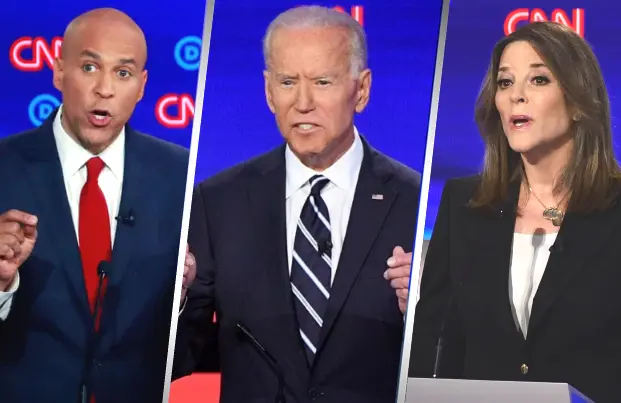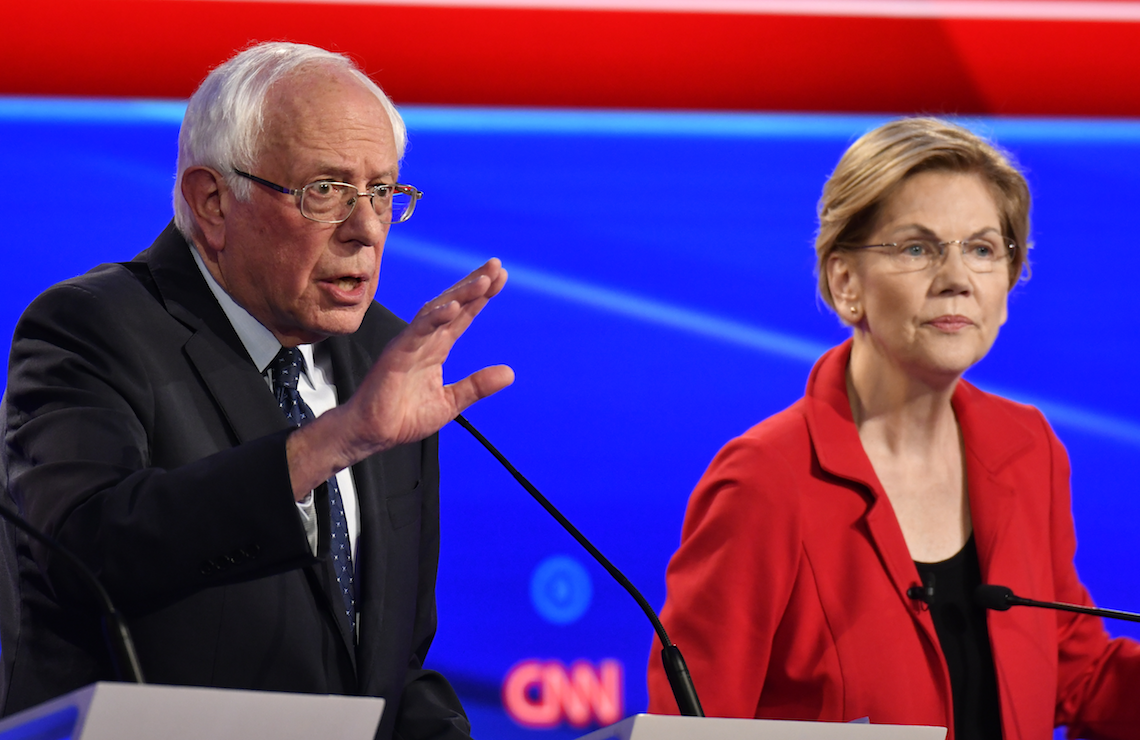CNN's Democratic Debates Had Their Moments ... and Marianne
-
 Cory Booker, Joe Biden and Marianne Williamson on stage at this week's Democratic Primary Debates
Cory Booker, Joe Biden and Marianne Williamson on stage at this week's Democratic Primary DebatesRemember “the moment” in the last round of Democratic presidential debates? That moment when Sen. Kamala Harris called out Joe Biden for consorting with segregationists and opposing mandatory school busing — an attack Biden seemed unprepared for? That moment was fresh in viewers’ minds when the pollsters came calling. Biden’s support swooned by 6, 8, even 10 points in some polls in the days after his exchange with Harris.
But the next wave of polls, completed just before this week’s second debate doubleheader, showed the former Vice President’s support floating back to the surface, at about 33 percent, where it was a month earlier. What's the lesson here? Television is great at producing moments of high drama, but that’s all they are — moments.
Think of a memorable debate moment. For me it was when Sen. Lloyd Bentsen turned to Dan Quayle in 1988 after Quayle had once again invoked the memory of John F. Kennedy, who once was a young senator. Bentsen said calmly, “I knew Jack Kennedy. Jack Kennedy was a friend of mine. Senator, you're no Jack Kennedy.” Bentsen, you may recall, was not elected Vice President.
And this isn’t even that high-stakes a debate. It’s the summer before the summer before the election. Most of the candidates who appeared on stage this week will vanish because the Democratic Party has set a 2 percent polling threshold to qualify for the next round of debates. Two percent! Five candidates are already in, so that leaves Cory Booker, Beto O’Rourke, and Andrew Yang as the three candidates on the bubble, needing a post-debate bump to ensure they’re still debating in September.
Unfortunately for O’Rourke, whose campaign has thus far failed to electrify anyone, it was his misfortune to be randomly selected for Tuesday’s broadcast, while the media’s attention stayed focused on Wednesday’s debate and the resumption of the Biden-Harris hostilities. Even worse, O’Rourke’s progressive-ish stance on key issues made him less of a foil to the two candidates in the center of the room — senators Bernie Sanders and Elizabeth Warren — than two more moderate white males, John Delaney and Rep. Tim Ryan.

Delaney held a gerrymandered safe seat in Maryland from 2013 to 2019 and claims to have announced his candidacy before any other Democrat, but I literally have no memory of him in the June debates. However, because he fit neatly into the media narrative for Tuesday’s debate — progs versus mods — Delaney got an inordinate amount of camera time so that he could challenge Warren and her stack of big-dollar governmental reforms, including a “Medicare for all” plan that opponents say will cost tens of trillions.
Prodded by CNN’s Jake Tapper, Delaney argued that “Democrats win when we run on real solutions, not impossible promises, when we run on things that are workable, not fairy tale economics.”
Warren couldn’t wait to take that apart, in what became one of the night’s few viral moments. “You know, I don't understand why anybody goes to all the trouble of running for president of the United States just to talk about what we really can't do and shouldn't fight for,” Warren said indignantly, as wild applause broke out in the hall.
Also on stage Tuesday was Mayor Pete Buttigieg, the fifth highest-polling candidate, sounding calm and pleasingly wonky. After listening to his rivals batting around ideas for reforming immigration and gun laws, Buttigieg jumped in to note that Democrats had been floating ambitious plans like these for 20 years. Nothing would happen with these plans, though, until “structural reform” happened. And then he explained, in simpler terms, what that meant.
“This is a country that once changed its Constitution so you couldn’t drink and changed it back because we changed our minds, and you’re telling me we can’t reform our democracy in our time?” Buttigieg said. “We have to — or we will be having the same argument 20 years from now.”
Mayor Pete, who seems far more impressive in a one-on-one interview than when speechifying, saw his poll numbers plateau this summer. But even if his quest for the Oval Office comes up short, the vice president’s office is just down the hall. He sort of sounded like he was angling for that.
Overall, there was little from Tuesday’s debate to fault viewers for tuning into the Bachelorette finale instead. If you were one of those, I would commend to watch just the one clip below of author Marianne Williamson holding forth on race and explaining the math behind her $500 billion reparations figure. I’ll say this, she’d make a helluva warmup act at next year’s campaign rallies.
Wednesday’s main event was kind to nearly everyone who took part — even the former Vice President, who took incoming from all sides. Almost every challenger on stage threw themselves into the scrum, resulting in an occasionally chaotic but highly entertaining and surprisingly useful exchange of ideas.
Two senators who had previously seemed almost lifelike, Kirsten Gillibrand and Michael Bennet, were much more animated this time around.
Gillibrand flung in Biden’s face an old op-ed he had written arguing that working moms “create the deterioration of family” by leaving their kids in day care. “So under Vice President Biden's analysis, am I serving in Congress resulting in the deterioration of the family?” she asked coolly.
Biden harrumphed, “That was a long time ago,” and tried to pivot, but Gillibrand demanded a response. Finally, Biden groused that the senator had praised his efforts to help working women in the past, adding, “I don’t know what’s happened except that you’re now running for president.”That zinger may not launch a thousand memes, and it’s too wordy for a T-shirt, unlike Bernie Sanders’ cri de couer from Tuesday — “I wrote the damn bill!” — that was already emblazoned on merch by next morning. But his retort, and others he delivered seemingly off-the-cuff during Wednesday’s fast-moving debate, likely reassured the 33 percent who back him that the Biden of old was back.
The same couldn't be said of Harris, who not only didn't make a dent in the veep's armot but stumbled when confronted by her own service record. Oddly enough, the challenge came from the low-polling Hawaiian congresswoman and veteran Tulsi Gabbard.
“Senator Harris says she’s proud of her record as a prosecutor,” Gabbard began, “but I’m deeply concerned about this record. There are too many examples to cite but she put over 1,500 people in jail for marijuana violations ... She blocked evidence that would have freed an innocent man from death row until the courts forced her to do so. She kept people in prison beyond their sentences to use them as cheap labor for the state of California.”
Harris replied by citing some boilerplate about her role in criminal justice reform and yadda yadda until Tapper cut her off.
Speaking of CNN, the Democrats’ preferred mode of working the refs was to accuse its journalists of moonlighting for Fox. “Jake, your question is a Republican talking point,” scolded Sanders when Tapper pushed him on his progressive policies. Warren pushed back twice in similar fashion, and on Wednesday, when Tapper challenged Harris on how she would pay for her universal health care plan, she looked unsure how to respond until she remembered the all-purpose retort: “We cannot keep with the Republican talking points on this!”
Likewise, Don Lemon — who calls out the president’s racism and misogyny on a nightly basis on his CNN show — was himself called out by Julian Castro after reading a quote criticizing Castro’s “open borders” immigration plan. “Open borders is a right-wing talking point!” Castro thundered. Except that Lemon had just quoted to him from Jeh Johnson, the homeland security chief under President Obama, in whose cabinet Castro also served.
Anyway, CNN journalists do not exactly lead the list of media people doing the GOP’s bidding. Lemon, Tapper, and Dana Bash were there to do what they do best — put mildly challenging questions to public figures — while also managing ten egos with live microphones, all of them clamoring for time. It was a mostly thankless task that they are paid handsomely to do every election cycle. (The exception was Castro, of all people, thanking CNN during his closing statement.) But hey, at least CNN stuck to a conventional format this time. Remember the godawful YouTube debate in 2007?
As for the bubble candidates, Yang did his best to bring a Ross Perot flavor to the Democratic debate. For someone who consistently stopped talking before his time was up, Yang’s proposals, like his $1000-a-month-for-everybody plan, felt fully fleshed out and even appealing in an alternate-universe kind of way. He also chimed in with useful anecdotes that were models of concision.
“As someone who’s run a business, I can tell you flat-out our current health care system makes it harder to hire,” Yang said. “If we say we're going to get health care off the backs of businesses and families, then watch American entrepreneurship recover and bloom. That's the argument we should be making to the American people.”
Then there’s Cory Booker. Watching him on television I sometimes wonder: Why is he not doing better in the polls? He has passion, he’s quick on his feet, and people like him — even Joe Biden, who in an effort to defuse a tense exchange reached over and touched Booker on the arm while referring to him as “our future President.” Booker immediately laughed, as though the two men had enjoyed friendly disputes like this a hundred times before.
And that’s the final point to make about these otherwise meaningless debates. Television is about optics, and Biden’s were overwhelmingly favorable — nothing flashy, just continuous ease and confidence. In his opening statement he looked the viewer in the eye and declared, “I'm running for president to restore the soul of this country.” Then he used the same line in his closing remarks.
He can’t live off that line forever, but for the moment, it’s working.
Aaron Barnhart has written about television since 1994, including 15 years as TV critic for the Kansas City Star.
TOPICS: CNN, Andrew Yang, Bernie Sanders, Beto O’Rourke, Cory Booker, Elizabeth Warren, Joe Biden, Kamala Harris, Kirsten Gillibrand, Marianne Williamson, Pete Buttigieg, 2020 Presidential Election, Cable News
- South Park season 28 episode 5 ending explained: Did the baby Antichrist die?
- Why did Trump Call Kaitlan Collins “Stupid and Nasty” Over a Ballroom Question? Reasons explored
- “You can’t make this up”: Jake Tapper mocked over viral J6 pipe bomber Brian Cole “white man” description
- What was Valerie Hoff DeCarlo’s N-word controversy? Former CNN anchor dies at 62